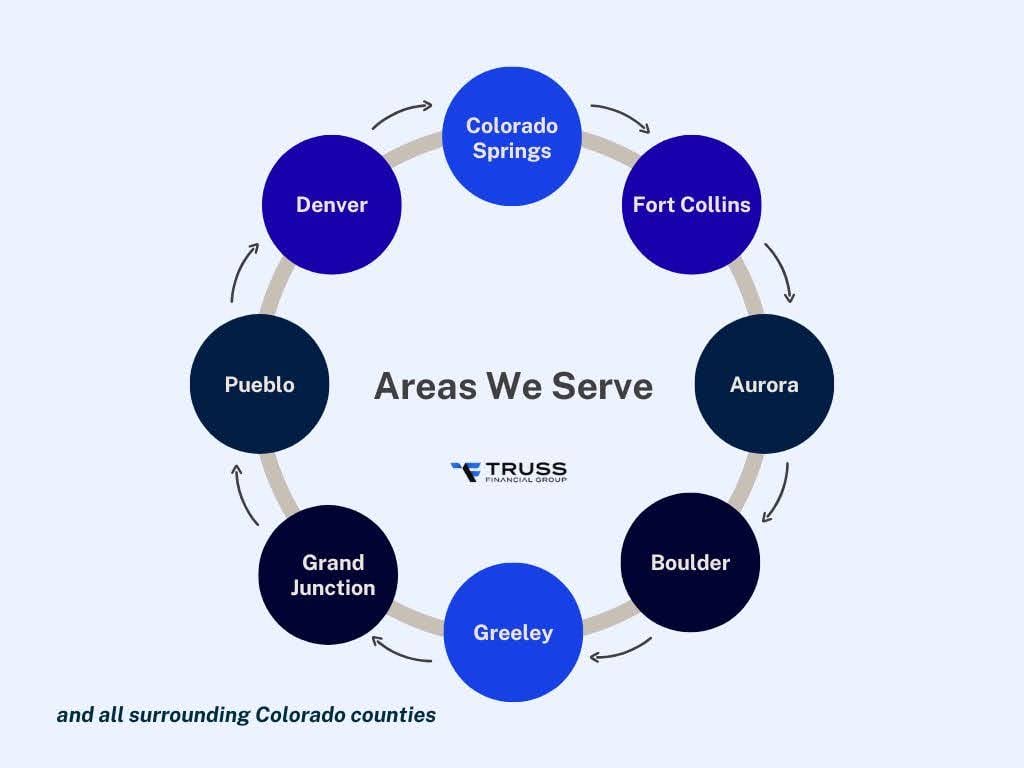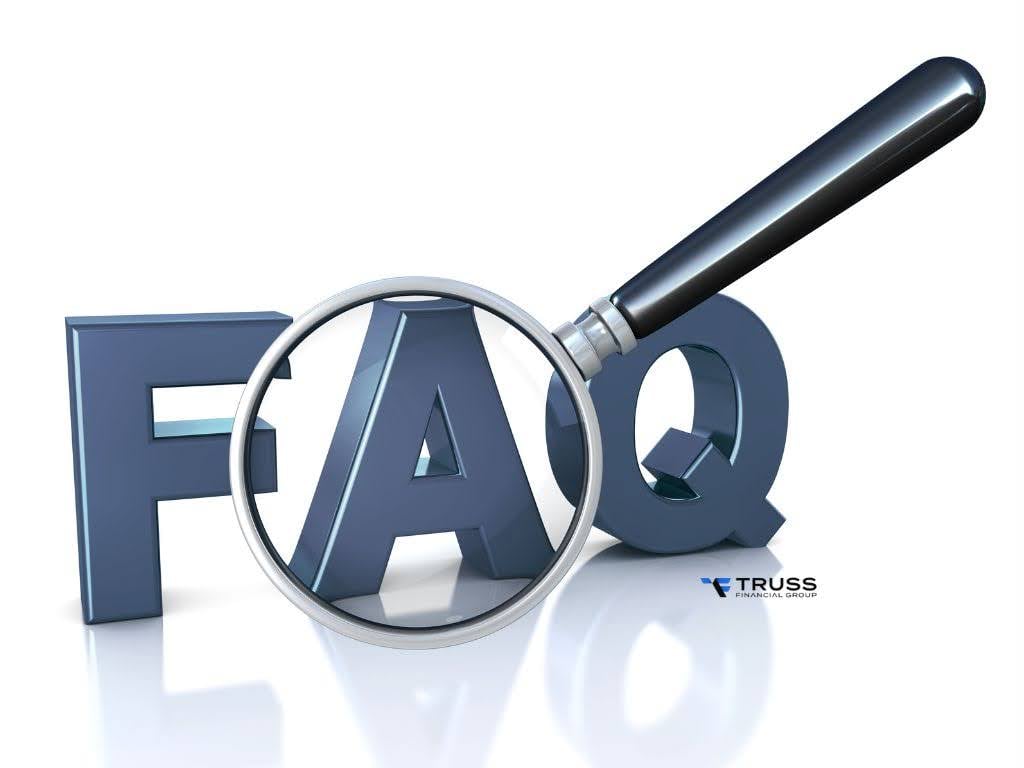Colorado Mortgage and Home Loans
Securing your Colorado home with the right financing is all about preparation and choosing the best loan program. Whether you’re a first-time buyer or looking to refinance an existing property, understanding Colorado’s mortgage landscape will help you navigate the process with confidence.
In this guide, we’ll explore everything from minimum requirements and loan options to special programs (like CHFA for first-time buyers) and current market trends. Truss Financial Group offers competitive rates and expert local guidance to make your homeownership journey smoother – from conventional loans to FHA, VA, USDA, jumbo, and even reverse mortgage options, we’ve got you covered.
4.6 from 700+ reviews
4.6 from 700+ reviews
4.6 from 700+ reviews
Home Loans in Colorado
Colorado’s mortgage process largely follows national standards, but there are a few local highlights to note, such as low property taxes and unique state programs for buyers. Below is a quick snapshot of key Colorado home loan facts:
Key Takeaways:
- Minimum credit score for most Colorado home loans: 620+ (FHA allows down to 580)
- Typical down payment: 3%–5% for conventional loans, 3.5% for FHA, 0% for VA and USDA loans
- Average 30-year fixed mortgage rate in Colorado: ~6.2% (as of late 2025)
- Median home price: ~$590,000 statewide (notably higher in expensive markets like Denver, Boulder, and Colorado Springs)
- Debt-to-income (DTI) ratio: ≤45% for most lenders (some allow up to ~50% with strong compensating factors
- CHFA – Colorado Housing and Finance Authority – offers down payment and closing-cost assistance for qualifying first-time and moderate-income buyers
- Property tax rate: ~0.5% effective rate (one of the lowest in the U.S.)
- Closing timeline: 30–45 days on average from contract to closing
- Loan options available through Truss Financial Group: Conventional, FHA, VA, USDA, Jumbo, CHFA-backed loans, and other non-QM (non-conforming) options

Areas We Serve: Denver • Colorado Springs • Fort Collins • Aurora • Boulder • Greeley • Grand Junction • Pueblo (and all surrounding Colorado counties).
How Do Home Loans Work in Colorado?
Home loans in Colorado follow a standard lending process similar to other states – from pre-approval to closing. The major steps include getting preapproved, shopping for a home, the formal underwriting of your loan, and finally closing the deal.
Truss Financial Group simplifies this process by offering multiple loan programs under one roof and guiding you at each step. Here’s an overview of a typical mortgage timeline:
| Step | Typical Duration | Description |
| Preapproval | 1–3 days | Lender reviews your credit, income, and assets to preapprove you for a loan amount. This makes you a more credible buyer. |
| Appraisal | 5–10 days | An independent appraisal confirms the home’s value for the lender, ensuring it justifies the loan amount. |
| Underwriting | 1–2 weeks | The lender’s underwriting team does a final review of your financials and the property. They may request additional documents during this period. |
| Closing | ~1 day | You sign final documents, pay any remaining closing costs, and the loan is funded. You receive the keys to your new home! |
How long does the mortgage process take in Colorado?
Typically about 30–45 days from loan preapproval to closing, assuming no major delays.
What Are the Requirements to Buy a Home in Colorado?
To buy a home in Colorado, you must meet the standard mortgage requirements, which include acceptable credit, manageable debt load, and proof of income/assets. Here’s a breakdown of typical requirements:
| Requirement | Typical Standard | Notes |
| Credit Score | 580–640+ | Varies by program (e.g. 580 for FHA, 620+ for conventional loans). Higher scores can improve your rate. |
| DTI Ratio | ≤45% | Your debt-to-income should be 45% or less. Some programs allow higher (up to ~50%) with strong compensating factors. |
| Down Payment | 0%–5% | Depends on loan type (0% for VA/USDA; as low as 3% for certain first-time buyer conventional loans). |
| Employment | ~2 years history | Steady employment in the same or related field is preferred. Lenders will verify income and job stability. |
| Documentation | Income & asset proofs | Recent pay stubs, W-2s or tax returns, bank statements, and ID are required for underwriting. Be prepared to provide detailed documentation. |
Can self-employed buyers qualify in Colorado?
Yes. In addition to standard loans, Truss Financial offers bank-statement and asset-based loan programs for entrepreneurs and self-employed borrowers. These loans consider your business revenue or assets in lieu of traditional W-2 income, making it easier for self-employed buyers to qualify.

What Home Loan Options Does Truss Financial Group Offer in Colorado?
Truss Financial Group provides a full spectrum of home loan options to suit different needs. Whether you’re a first-time buyer with minimal down payment or a seasoned homeowner buying a luxury property, there’s a program for you. Here are some of the main loan types and their features:
| Loan Type | Ideal For | Down Payment | Credit Score (Min) | Key Benefit |
| Conventional | Buyers with solid credit and moderate down payment saved | 3% – 20% (3% for first-time buyers) | 620+ | Flexible terms, no upfront mortgage insurance. PMI can be removed with 20% equity. |
| FHA | First-time buyers or those with fair credit | 3.5% (can be gift funds) | 580+ | Easier qualification, low credit OK, but requires FHA mortgage insurance. |
| VA | U.S. Veterans and active-duty military (and some spouses) | 0% (no down payment required) | ~620 (flexible) | No PMI and very competitive rates. Thank you for your service! |
| USDA | Buyers in eligible rural areas | 0% (100% financing) | ~640 (flexible with manual UW) | Zero down payment, but must purchase in USDA-defined rural communities. |
| Jumbo | High-value homes above conforming loan limits | 10% – 20% (higher-end homes often 20%) | ~700+ | Allows large loan amounts above $787,750 (limit varies by county). Often slightly higher rates and stricter criteria. |
| CHFA | Colorado residents needing assistance | 0% – 3% (often paired with CHFA down payment assistance) | 620+ | Down-payment assistance programs and below-market rates via Colorado Housing and Finance Authority. Great for first-time buyers. |
| Bank Statement (Non-QM) | Self-employed or non-traditional income borrowers | ~10% – 20% (varies) | Alternative documentation (no set FICO min) | No tax returns needed – qualify based on bank deposits or assets. Useful for business owners. |
Note: Truss also helps with reverse mortgages (for homeowners 62+ looking to tap home equity) and other niche products. These specialized loans are handled case-by-case to ensure they fit the borrower’s needs.
Buying a House in Colorado: What to Expect
Colorado’s real estate market has been competitive but is showing signs of stabilizing. In the popular mountain and metro regions, demand remains strong, yet inventory has improved compared to the frenzied market of a few years ago.
This means buyers may face less bidding wars than during the 2020–2022 boom, but should still be prepared for regional price differences. Below is a look at median home prices in a few key Colorado cities, along with an example down payment and monthly payment estimate:
| City | Median Price | 10% Down Payment | Estimated Monthly Payment |
| Denver | $585,000 | $58,500 | ~$3,225 (principal & interest) |
| Colorado Springs | $475,000 | $47,500 | ~$2,550 (principal & interest) |
| Fort Collins | $525,000 | $52,500 | ~$2,900 (principal & interest) |
Est. monthly payment assumes a 6.2% 30-year fixed mortgage rate for a loan covering the remaining 90% of the price. Taxes and insurance are not included in these estimates.
As shown, home prices vary by city. Denver and Fort Collins have higher median prices (roughly in the mid-$500Ks), while Colorado Springs is a bit more affordable around the mid-$400Ks. Boulder, not shown above, is even higher – often around $800K–$1M median – reflecting its unique desirability. Keep in mind that a larger down payment or a lower interest rate would reduce the monthly payments shown.
What Credit Score Is Needed to Buy a House in Colorado?
The credit score needed to buy a home in Colorado depends on the type of loan you use:
- Conventional Loan: Generally 620 or higher. Some conventional programs require 640, but many lenders accept 620 for first-time buyer programs. A higher score (e.g. 740+) can help you secure a better interest rate or lower private mortgage insurance.
- FHA Loan: 580 or higher (for the minimum 3.5% down payment). FHA is more forgiving on credit; scores between 500–579 might qualify with 10% down, but most FHA borrowers in practice have 580+.
- VA/USDA Loans: Typically around 620, but flexible. The VA doesn’t set a hard minimum – lenders often want a 620 FICO, though some may approve lower if other factors are strong. USDA rural loans usually require about 640 for an automated approval, but under manual underwriting they can be more flexible.
- CHFA Programs: 620 minimum mid-score. The Colorado Housing and Finance Authority requires at least a 620 for its assisted loans. They also consider applicants with no traditional credit history on a case-by-case basis.

Can I buy a home in Colorado with fair credit (e.g. low 600s)?
Yes. If your credit score is in the low-to-mid 600s, you still have options. FHA loans are designed for moderate credit buyers and only require 580+, and CHFA’s first-time buyer programs also accept 620. Truss Financial Group can work with you to find a suitable loan and even provide guidance on improving your credit profile to qualify for better rates.
How Much Money Do You Need to Buy a House in Colorado?
Beyond the mortgage loan amount, buying a home comes with upfront costs. It’s important to budget for these expenses so you’re not caught off guard. Here are the typical cash requirements when purchasing in Colorado:
| Expense | Typical Range | Notes |
| Down Payment | 0% – 5% (of purchase price) | Varies by loan type. VA and USDA require no down payment. FHA requires 3.5%. Conventional loans range from 3% (for first-time buyers) to 5% or more. Putting more down (e.g. 10-20%) can lower your monthly payment. |
| Closing Costs | ~2% – 5% (of price) | Includes title insurance, lender fees, appraisal, recording fees, etc. In Colorado, average closing costs are about 2–5% of the home’s price. For example, on a $400,000 home, expect ~$8,000–$20,000 in closing fees. Sometimes the seller can offer concessions to help cover these costs. |
| Property Taxes | ~0.55% of home value (annual) | Colorado has very low property taxes – around 0.5% effective rate on average. On a $500,000 home, annual property tax might be only ~$2,500 (varies by county). This is among the lowest property tax rates in the nation, which helps reduce ongoing homeownership costs. |
| Homeowners Insurance | $1,000–$1,500/year (varies) | This is an annual hazard insurance to protect your home (required by lenders). The cost depends on your home’s value, location, and coverage level. Budget around $100 or more per month. Higher in areas with risks (hail, wildfire) and for larger homes. |
For a typical first-time buyer, the biggest hurdle is usually the down payment and closing costs. Programs like CHFA can help with those (via grants or second mortgages), as noted earlier. Always have a bit of extra savings beyond these figures as well – you’ll need some cash for moving expenses, initial maintenance, and creating an emergency fund for your new home.
What Are the Current Mortgage Rates in Colorado?
Mortgage rates change daily, but Colorado’s rates generally track the national averages closely. As of November 2025, average interest rates in Colorado are roughly as follows:
| Loan Term | Average Rate (APR) |
| 30-Year Fixed | ~6.25% (6.25% APR) |
| 15-Year Fixed | ~5.62% (5.63% APR) |
| 5/6 ARM (adjustable) | ~6.50% (6.88% APR) |
These rates are illustrative – actual quotes depend on your credit score, down payment, loan amount, and points paid. Colorado lenders often offer special rate incentives for certain programs (for example, CHFA loans can have below-market rates for eligible buyers). It’s wise to check with Truss Financial Group for a personalized quote, as we monitor local market conditions to get you the best deal.
How do Truss Financial Group’s rates compare in Colorado?
Truss Financial Group offers competitive, locally optimized rates that often match or beat the statewide averages. Because we work with various wholesale lenders and know the Colorado market, we can frequently find you a lower rate or better terms than large nationwide banks. In short, you’ll get a great rate and home-town service.

What First-Time Home Buyer Programs Are Available in Colorado?
Colorado Housing and Finance Authority (CHFA) is the key player in helping first-time and lower-income buyers. Truss Financial Group partners with CHFA to provide affordable mortgage options and down-payment assistance to eligible buyers across the state. CHFA programs come with features like competitive fixed interest rates, down payment/closing cost assistance, and more flexible qualification criteria.
Here are a few of the main CHFA-backed programs:
| Program | Assistance Available | Key Benefit for Buyers |
| CHFA SmartStep | Up to 4% of loan amount in down payment assistance (as a second mortgage) | 30-year fixed-rate loan with optional assistance. Great for repeat or first-time buyers who need help covering down payment or closing costs. The second mortgage has no monthly payments (repaid when you sell or refinance). |
| CHFA Preferred | Around 3% or more in assistance (grant or silent second loan) | Can be a conventional Fannie Mae/Freddie Mac loan with reduced mortgage insurance and a grant for down payment. Income limits apply. Affordable monthly payment due to lower PMI and interest. |
| CHFA FirstStep | Grants or deferred second loan (typically 3-4% of price) for down payment/closing costs | Specifically for first-time buyers (or those buying in targeted areas or qualifying veterans). Comes with CHFA’s lowest interest rates and can be combined with down payment assistance that does not require monthly repayment. |
In addition to CHFA, some local municipalities and nonprofits offer first-time buyer grants or forgivable loans (for example, the Metro DPA program in Denver, or assistance programs in Boulder County). Truss Financial help you identify and apply for these programs if you qualify.
Who qualifies for CHFA assistance?
CHFA typically requires a 620+ credit score, completion of a homebuyer education class, and that your income and the home price fall below certain county-specific limits. You also must occupy the home as your primary residence.
In most cases, you need to be a first-time buyer (defined as not owning a home in the past 3 years), unless the property is in a targeted area or you’re an eligible veteran. If you meet these criteria, CHFA programs can significantly reduce your out-of-pocket costs to buy a house.
How Much Do You Need for a Down Payment in Colorado?
One of the biggest myths in home buying is that you need 20% down – in reality, many Colorado buyers put far less. Here are the minimum down payments for common loan types:
| Loan Type | Minimum Down | Eligible Borrowers |
| Conventional (Conforming) | 3% (of purchase price) | First-time buyers can put just 3% down with certain conventional loan programs. Repeat buyers typically need 5% down or more. |
| FHA | 3.5% | Available to anyone meeting FHA credit/income guidelines. Popular with first-time buyers or those with moderate credit (580+). |
| VA | 0% | U.S. veterans, active-duty service members, and some surviving spouses. No down payment required thanks to VA guarantee – an incredible benefit for those who serve. |
| USDA | 0% | Buyers in USDA-eligible rural areas. Household income must be under the local limit. Allows 100% financing with no down payment. |
| CHFA Assist (with any loan type) | $1,000 (minimum borrower contribution) | Qualifying Colorado residents. CHFA programs can cover the remainder of down payment via grants or second mortgages, so buyers often need to put in only ~$1,000 of their own funds (plus any upfront appraisal or inspection fees). |
As you can see, zero-down financing is available in Colorado if you qualify for VA or USDA, and even conventional loans have low-down options. That said, if you can afford a bigger down payment it may be beneficial: a higher down payment lowers your loan-to-value ratio, which can reduce your interest rate and eliminate PMI (for conventional loans once you reach 20% equity).
It’s all about finding the right balance for your financial situation – Truss can advise you on the pros and cons of different down payment levels.
Is It a Good Time to Buy a House in Colorado?
Given recent market trends, yes, it can be a good time to buy in Colorado. Home prices have moderated since the peak of 2022, and inventory (the number of homes for sale) is gradually improving statewide. This means buyers have more choice and negotiating power than they did during the ultra-hot market a couple years back.
While mortgage rates are higher now than in 2021, they are still below historical peaks and have shown signs of stabilizing. Remember, you can always refinance later if rates drop, but you can’t go back in time to buy a house at yesterday’s prices.
Colorado’s strong economy and job growth also make it a sound long-term investment – people continue to move here for work and quality of life, sustaining housing demand.
In fact, some local real estate experts say this is one of the most favorable buyer’s markets in over a decade: Inventory is up, competition is down, and sellers are more flexible, even if interest rates aren’t ideal.
The table below summarizes a few key factors and what they mean for buyers right now:
| Factor | Current Trend (2025) | Buyer’s Advantage |
| Home Prices | Stabilizing / leveling off (after rapid rises in 2020–2022) | More options available and less risk of price “overpaying.” You may even find motivated sellers willing to negotiate on price or repairs. |
| Interest Rates | Moderate (~6–7% range for 30-year fixed) | While not as low as the 3% rates of the past, these are manageable. Buyers can marry the house and date the rate – purchase now, and potentially refinance to a lower rate in the future if rates fall. |
| Housing Inventory | Rising slowly (more listings than last year) | Reduced competition. You’re less likely to face bidding wars in many areas, and you can take a bit more time to find the right home. |
| Rents | Increasing annually (high demand for rentals) | Buying builds equity. With rents high and climbing, owning lets you lock in a fixed housing payment and build wealth over time, rather than paying your landlord’s mortgage. |
Every market is different, of course. Some ultra-desirable neighborhoods in Colorado (for example, certain parts of Denver or mountain towns like Aspen) may always be competitive. But broadly, buyers in 2025 have far more leverage than a couple of years ago. If you’re financially ready, this is a promising window to purchase a home in Colorado.
Apply for Your Colorado Home Loan
Ready to get started on your Colorado homeownership journey? Truss Financial Group is here to help. As a local Colorado mortgage lender, we understand the state’s housing market and offer various loan programs to fit your needs. Our team can pre-qualify you quickly, help you determine which loans (and down payment assistance programs) you might qualify for, and guide you through the application and approval process step by step.
Contact Truss Financial Group today to explore your mortgage options, get pre-approved for a home loan, and see if you qualify for CHFA or other first-time buyer assistance.

Frequently Asked Questions
- What are the main Colorado mortgage loan requirements?
Generally, you’ll need a credit score around 620+, a steady income and employment history, and a reasonable debt-to-income ratio (usually under 45%). Lenders will also require an appraisal of the home and various documents (bank statements, pay stubs, etc.) during underwriting. If your profile is a bit weaker (say, a 600 credit score or higher DTI), you might still get approved with certain programs or by providing compensating factors, but 620/45% is a common benchmark for smooth approval.
- What is CHFA and how does Truss Financial Group work with it?
CHFA stands for the Colorado Housing and Finance Authority, it’s the state’s housing agency that offers special affordable loan programs. CHFA provides low-interest mortgages for moderate-income buyers and can also give down payment assistance in the form of grants or second mortgages. Truss Financial Group is an approved CHFA participating lender, which means we can originate CHFA loans for you. We’ll help you determine if you meet CHFA’s qualifications (income, credit, etc.), and if so, we handle the paperwork and coordination so you can take advantage of those programs. In short, CHFA supplies the money/aid, and Truss helps you access it seamlessly.
- Are USDA loans available in Colorado?
Yes, USDA Rural Development loans are available in many parts of Colorado. In fact, a large portion of the state geographically is USDA-eligible. These 0% down loans are designed for rural and some suburban areas. For example, 100% of Delta and Fremont Counties are eligible for USDA financing. Even in more populated counties like Larimer (Fort Collins area), outside the city centers you can find eligible zones.
- What are typical closing costs in Colorado?
Closing costs usually run about 2%–5% of the purchase price in Colorado. On a $300,000 home you might see roughly $6,000–$15,000 in total closing fees. This includes charges like lender origination fees, title insurance, escrow fees, recording fees, appraisal, credit report, and sometimes up-front insurance or tax escrows. The range varies based on the price of the home, the lender’s fee structure, and your county (some counties have higher title or recording fees).
- Can Truss Financial Group help refinance my Colorado home?
Absolutely. In addition to purchase loans, Truss Financial offers refinancing services for homeowners statewide. Whether you want to refinance to a lower interest rate, switch from an FHA loan to a conventional loan (to remove PMI), or take cash out from your home’s equity for things like home improvements or debt consolidation, we can assist. We’ll analyze your current loan and goals to see if refinancing makes sense. Even if you purchased your home recently, if rates drop in the future, we can help you refinance to save money on your monthly payment.
Have more questions or are you ready to take the next step? Contact Truss Financial Group, we’re happy to provide personalized guidance on Colorado home loans, whether you’re buying, refinancing, or just exploring your options. With the right knowledge and a dedicated lender by your side, owning a home in Colorado is closer than you think!
Trusted by 1,964 people
Get a free custom rate quote
- 81% approval rate
- No commitment
👉 Filling out this form won’t affect your credit score.
Get the information you need to make confident decisions
Discover your borrowing power and plan your mortgage journey with knowledge on your side.
Get a quote- No documents required
- No commitment
- No commitment
Get a quote in 3 easy steps
Tell us what you want
Fill out our online form to help us understand your financial situation and loan needs.
We get to work for you
We review your info and look for competitive rates that match your specific goals.
You get a personalized quote
You’ll receive a customized rate quote that meets your unique profile.